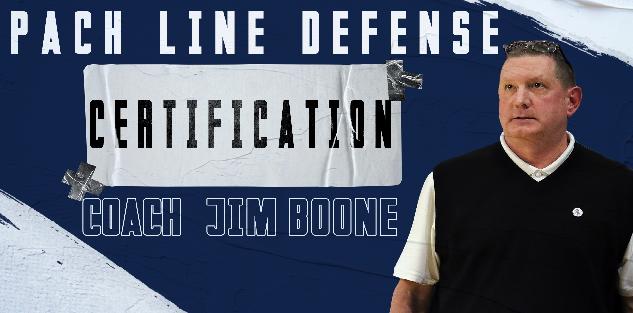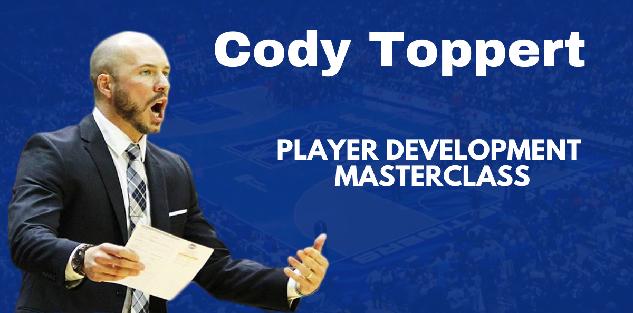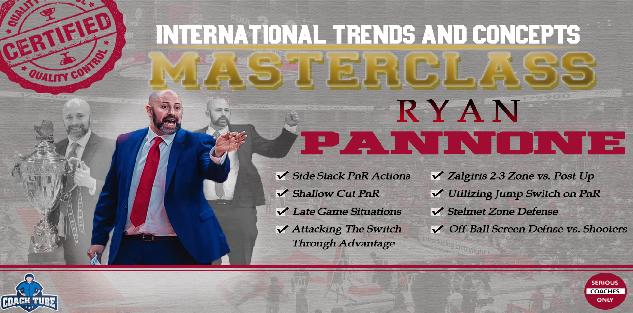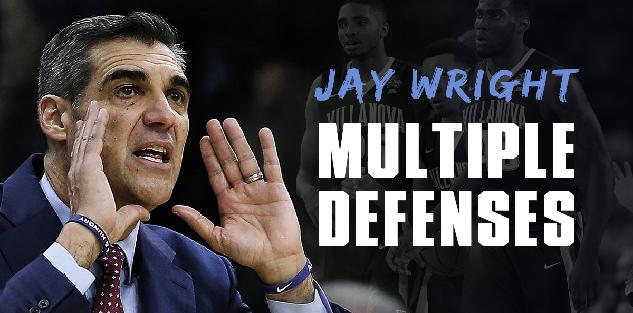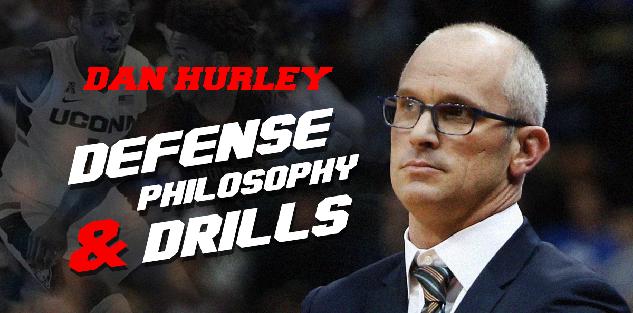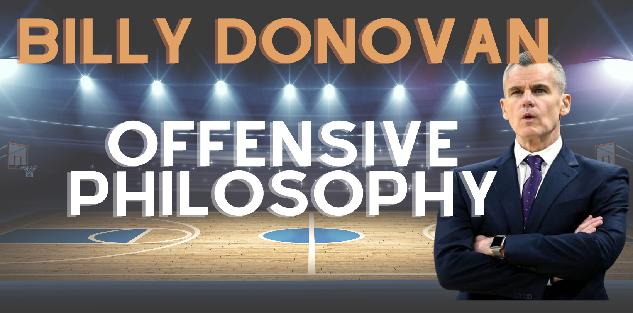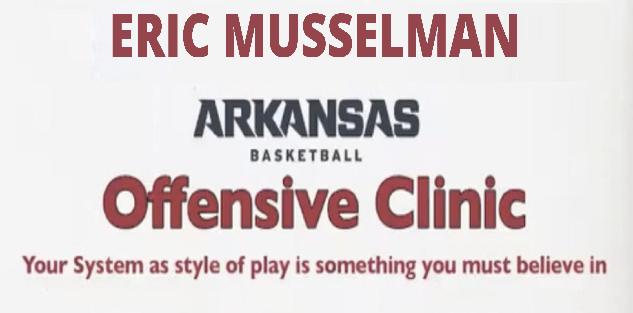Featured courses
- Two Great Game Situational Workouts For the Basketball Offseason by Grant Young
- Two Reads Basketball Players Must Understand Before Executing the Ball-Screen by Grant Young
- Two of LSU Coach Kim Mulkey’s Game-Winning Inbounds Plays by Grant Young
- Three Effective Early-Season Defensive Basketball Drills by Grant Young
- Four Essential Tips For Basketball’s 1-3-1 Zone Defense by Grant Young
- Four Zone Defense Drills to Strengthen Your Team by Grant Young
- How to Beat the Three Most Common Pick and Roll Coverages by Grant Young
- Two Drills to Improve Shooting at the Start of the Basketball Season by Grant Young
- Core Basketball Principles That Dallas Mavericks Coach Sean Sweeney Teaches by Grant Young
- Three Competitive Shooting Drills For Your Basketball Team by Grant Young
- How To Teach The ‘I’ Generation of Basketball Players by Grant Young
- Three Elite Drills to Begin a Basketball Practice With by Grant Young
- How to Build a Championship-Winning Basketball Team Culture by Grant Young
- Two of Texas Women’s Basketball Coach Vic Schaefer’s Tips For Team Culture by Grant Young
- Atlanta Dream WNBA Coach Brandi Poole’s Four Sets for Secondary Offense by Grant Young
- NC State Basketball Coach Brett Nelson’s 4 Crucial Point Guard Qualities by Grant Young
- Kentucky Coach Mark Pope’s Five Guard Rules For Offense by Grant Young
- McNeese State Basketball Coach Will Wade’s 4 Core Pillars by Grant Young
- 4 Tips To Instantly Improve Your Free Throw Shooting by Tyler Linderman
- Assemble a Championship-Caliber Basketball Rotation by Brandon Ogle
- Two of UConn Coach Dan Hurley’s Key Defensive Drills by Grant Young
- Four Post Moves All Basketball Forwards Should Have In Their Bag by Grant Young
- Four of Baylor Coach Nicki Collen’s Midseason Pick and Roll Adjustments by Grant Young
- WNBA Legend Sue Bird’s Two Tips For Attacking on Offense by Grant Young
- Houston Coach Kelvin Sampson’s Three Keys for Building a Basketball Program by Grant Young
- Two of Tom Izzo’s Top Michigan State Defensive Drills by Grant Young
- Four of Olympic Gold Medalist Coach Mechelle Freeman’s Relay Race Strategies by Grant Young
- Three Key Strategies Will Wade Uses to Build a Dominant Team by William Markey
- Five UConn Huskies Men’s Basketball Plays That You Can Use by Grant Young
- Three Tips for Maintaining Team Culture at the End of a Basketball Season by Grant Young
- Three Dribble Drive Motion Drills to Teach Your Basketball Team by Grant Young
- Three Dribbling Drills For Non-Primary Ball Handlers by Grant Young
- Four Advanced Ball Handling Drills For Basketball Guards by Grant Young
- Three Tips to Sharpen Your Post Player’s Footwork in Basketball by Grant Young
- These Three Pick and Roll Drills Are Crucial For Any Ball Screen Offense by Grant Young
- Three Closeout Drills to Improve Basketball Shooting Defense by Grant Young
- Three Tips to Perfect the Packline Defense in Basketball by Grant Young
- Four Keys to Executing the Read and React Offense in Basketball by Grant Young
- Three Tips to Develop Elite Basketball Shooters by Grant Young
- Three Crucial Keys to Executing the 5 Out Offense in Basketball by Grant Young
- These Three Offensive Sets Will Help You Beat Any Zone Defense by Grant Young
- Three Transition Basketball Drills To Play With More Pace by Grant Young
- Three 5 Out Offense Drills Any Basketball Coach Can Use by Grant Young
- Four Vital Techniques for a Motion Offense in Basketball by Grant Young
- Three Baseline Inbounds Plays To Win Your Basketball Team Games by Grant Young
- Four Drills For Sharpening the European Ball Screen Offense by Grant Young
- Three Positioning Tricks For a Basketball Zone Offense by Grant Young
- Three Rules to Perfecting Basketball's Lock Left Defensive System by Grant Young
- UCLA WBB Coach Cori Close’s Two Keys to Winning the Mental Game by Grant Young
- Four of Alabama Coach Nate Oats’ Favorite Basketball Drills by Grant Young
- Three Ways To Turn Transition Offense in Basketball Into Points by Grant Young
- Three Drills to Master Basketball's Pack Line Defense by Grant Young
- Three Transition Defense Drills to Halt Fast Breaks by Grant Young
- Four Offensive Rebounding Drills to Win Second Possessions by Grant Young
- 4 Defensive Technique Drills from Boston Celtics Assistant Coach Brandon Bailey by Marek Hulva
- 5 Drills to Improve Ball Handling by Tyler Linderman
- 13 FUNNY BASKETBALL GIFS by Alex
- BASKETBALL SPEED AND AGILITY: 8 QUESTIONS FOR COACHTUBE EXPERT RICH STONER by Jaycob Ammerman
- Defensive Strategies for Basketball by Ryan Brennan
- 4 Keys To Turning Your Program Into Championship Contender By Dallas Mavericks Coach Sean Sweeney by Marek Hulva
- 5 Components to Creating a Winning Basketball Program by Justin Tran
- Guide to Becoming a Lethal Scorer in Basketball by Justin Tran
- Zone Defense In the NBA Eastern Conference Finals by James Locke
- Mastering Court Mobility: Tips for Effective Movement in Basketball by Justin Tran
- 5 Basketball Shooting Drills: How to Develop a Sharpshooter by James Locke
- 6 Points of Emphasis for a Successful 5 Out Offense by Jaycob Ammerman
- Effective and Efficient Methods to Practice During the Basketball Season by Justin Tran
- Three Great Passing Drills From a Basketball Coaching Legend by Grant Young
- 7 Principles For Perfecting the Princeton Offense in Basketball by Grant Young
- How to Replicate A Modern NBA Offense by Grant Young
- Three Great Two-Ball Dribbling Drills For Basketball Development by Grant Young
- Two Rebounding Drills to Win Your Basketball Team Championships by Grant Young
- How to Improve Your Basketball Team’s Defense With the Shell Drill by Grant Young
- How Baylor Basketball’s Scott Drew Develops Elite Guard Play by Grant Young
- Off-Ball Movement Tips and Strategies: Lessons From the NBA Finals by James Locke
- Player Development: Scott Drew’s Tips for Producing NBA Guards by James Locke
- How to Execute a Spread Offense in Basketball by Grant Young
- Four Quality Quotes From Four Final Four Coaches by Grant Young
- A Guide to the Pack Line Defense by Alex Martinez
- 3 Defensive Build Up Drills to Improve Team Basketball Defense by Grant Young
- Battle of Two Great Coaches: Best Plays from the NBA Finals Contenders by Justin Tran
- 10 Creative Ways Athletic Programs Can Use a Video Board to Raise Money by Coach Williams
- How to Use 3 on 3 to Improve Your Basketball Team by Grant Young
- How to Defend the Pick and Roll by Grant Young
- Mastering Basketball Defense: Techniques, Drills, and Strategies for Success by Justin Tran
- Three Tips From The Coach Who Developed Giannis Antetokoumnpo by Grant Young
- 2023 NBA Draft: Skills and Technique from Top Prospects by Justin Tran
- From College to the Pros: Transitioning the Dribble Drive Offense by Justin Tran
- Positionless Basketball: Redefining Roles on the Court by Justin Tran
- Revolutionize Your Offense: Proven Concepts to Elevate Your Basketball Game by Justin Tran
- 5 Essential Fastbreak Drills Every Basketball Coach Should Know by James Locke
- How to Run a Circle Offense in Basketball by Grant Young
- Game-Changing Strategies: ATO Plays in the EuroLeague and Olympics by Justin Tran
- How to Stand Out at Basketball Tryouts by Grant Young
- How to Improve Your Basketball Team’s Transition Defense by Grant Young
- Indiana Fever GM Lin Dunn’s Two Keys For Women’s Basketball Coaches by Grant Young
- Strength Training Strategies Every Basketball Player Should Have by Grant Young
- A WNBA Basketball Coach’s Four Priorities In Transition Defense by Grant Young
- Three Adjustments to Make When Your Basketball Offense Isn’t Working by Grant Young
- Three Pillars to Applying Defensive Pressure on the Basketball Court by Grant Young
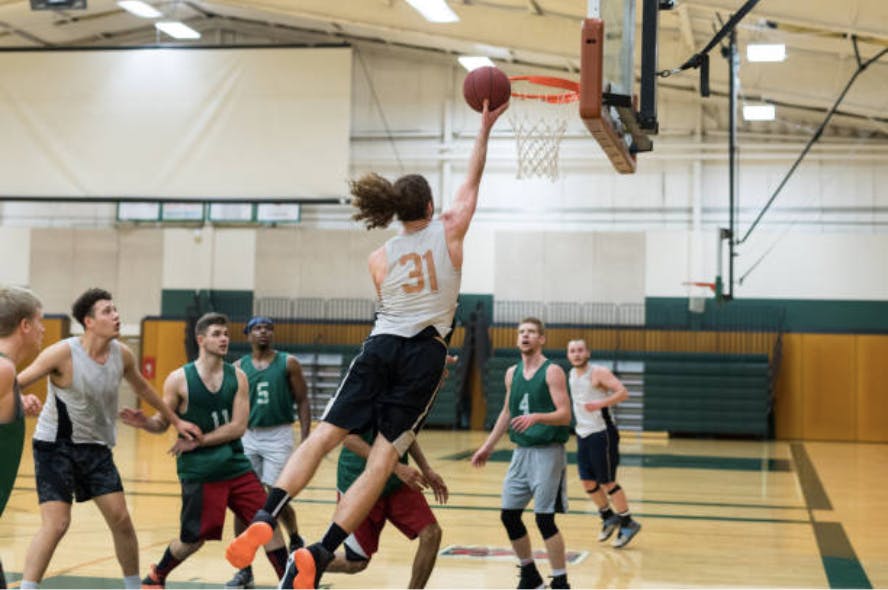
Effective and Efficient Methods to Practice During the Basketball Season
- By Justin Tran
As basketball season swings into action, it is crucial for athletes and teams to optimize their practice sessions for maximum effectiveness and efficiency. By implementing well-planned practice routines, athletes can sharpen their skills, enhance teamwork, and make improvements to their physical and mental capabilities. Investing time and effort into purposeful practices can give athletes a competitive advantage and help them perform at their peak when it matters most.
In this article, we will explore proven methods that will take your basketball practice to the next level. From sharpening fundamental skills to strategic drills and conditioning exercises, we’ll guide you through a variety of methods to help you make the most of your time on the court. Get ready to embrace the power of effective practice methods and become a force to be reckoned with this basketball season. So, lace up and get ready to unlock your full potential as we dive into the most effective and efficient basketball practice methods.
Organizing an Effective Practice
Coach Bobby Gonzales, former head coach for Seton Hall, has extensive coaching experience that sets him apart as a highly credible basketball coach. With over two decades of leading teams at various levels, including collegiate and internationally, he has achieved reputable results.
Coach Gonzales emphasizes being organized during practices, by creating a culture of organization and togetherness. Recognizing the significance of a cohesive and unified team, Coach Gonzales instills the value of player-led teams through captains by setting expectations before and after practices. You can do this by hosting meetings with your players and staff and listening to your players before they actually step on the court.
Gonzales has transformed the concept of efficiency in basketball practices through his strategic implementation of terminology, filming, and statistical analysis. Implementing a well-defined system of offense, defense, and communication, Coach Gonzales ensures that every player is on the same page by minimizing confusion on the court. Furthermore, Coach Gonzales emphasizes the importance of keeping statistics during his practices to enable objective evaluation, this can be focusing on things like rebounding, blocked shots, etc.
Additionally, Coach Gonzales incorporates filming practices to provide valuable feedback and enhance player development. By analyzing filmed practices, both individual players and the team can identify areas of improvement and refine their skills. Discover more here on how Coach Gonzales organizes his practices.
Designing Your Practices
Quoting Coach Doug Novak, when it comes to coaching your players, it should be a priority for them to love the game of basketball more after practices. Coach Doug Novak, assistant coach for Army basketball, encompasses a range of strategies that maximize player development and drive team success. Every element of his coaching style, from installation to free throws, is intended to unleash the full potential of his players.
The foundation of Coach Novak’s practices is installation and installation testing. Players effectively learn offensive and defensive systems by emphasizing continuous learning by practicing at half speed without pressure, in doing so this ensures a solid understanding of the team’s strategy. Towards the end of practice, installation testing raises the intensity and pressure to challenge your players. This testing phase allows players to apply what they have learned throughout practice and perform to their capabilities during games.
Players then go into individual and team skills. Individual skills receive devoted attention in Coach Novak’s practices. Shooting drills are a key component, they allow players to work on their technique, improve accuracy, and achieve a more consistent shooting performance to benefit the team. Mass skills can include things such as team fundamentals and communication. He emphasizes teamwork, teaching them team defense, team offense, rebounding, etc.
Furthermore, Novak implements the experiences players go through on situational offense and defense to replicate more game situations. A specific emphasis is placed on executing plays and offensive and defensive strategies in different game scenarios. By practicing these situations, players gain the confidence and skills needed to make quick decisions and adapt during games.
Lastly, Coach Novak emphasizes finishing strong with free throws, as players will be fatigued. He dedicates this time to refine free throw shooting skills to capitalize on multiple scoring opportunities. Find out more here about how Coach Novak facilitates his practices.
Strength and Conditioning Training
In the fast-paced and physically demanding sport of basketball, strength, and conditioning play a crucial role in enhancing performance and reducing the risk of injury. Basketball players’ bodies need to be prepared to handle the demands of the game with frequent sprinting, jumping, change of direction, and physical contact. This is where an effective strength and conditioning program becomes crucial.
According to Luka Svilar, a physical performance specialist, in terms of endurance “The higher the level of player’s endurance, the less negative the impact of fatigue on player’s specific skills and game performance”. The most effective way to build basketball endurance is to play basketball. The reasoning behind this is that basketball involves a variety of movements that require total body control, such as change of direction, jumping, side shuffling, backpedaling, full contact, acceleration, and deceleration. The three components of conditioning Luka Svilar breaks into are basic, specific, and competitive conditioning, with each component further simulating aspects of basketball.
In terms of strength training, Luka Svilar also recommends this, as strength and power development provides a solid base so players can continue to work on specific skills. Strength training directly impacts the rate of force development, which affects acceleration, jumping ability, and executing explosive movements such as pump fakes.
Strengthening the core and the entire body increases movement efficiency, this lowers energy use, and improves performance. Strength training that focuses on sport-specific movements and positions is proven to translate effectively on the court or field. Additionally, strength training enhances durability and resilience, minimizing the risk of common basketball injuries. Learn here how to further enhance your team’s strength and conditioning to maximize their potential on the court.
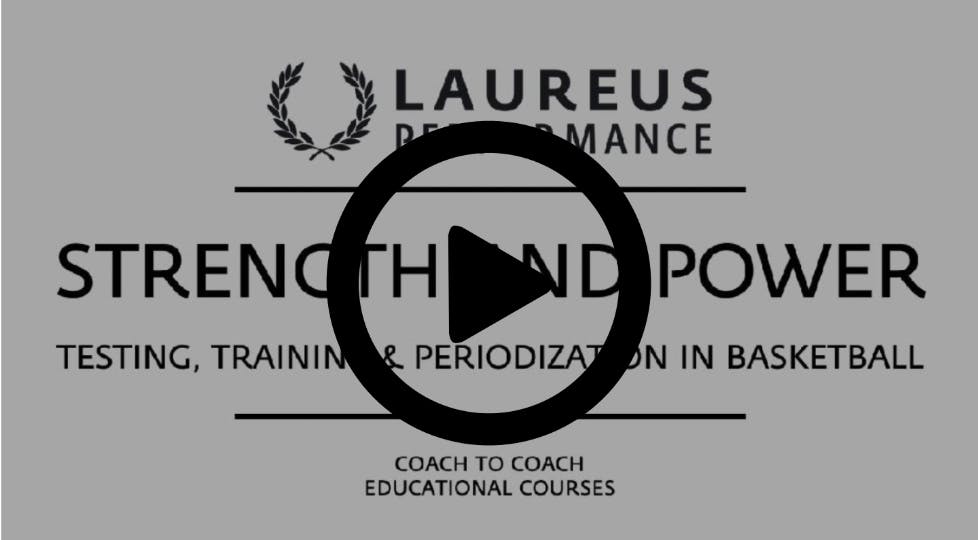
Purchase Both for 15% off: BUNDLE 2 - Endurance & Strength and Power for Basketballh-and-power-for-basketball?a=bc6250511f354b40aa69e0614">BUNDLE 2 - Endurance & Strength and Power for Basketball
Conclusion
In conclusion, optimizing basketball practice sessions is vital for athletes and teams to reach their full potential. By implementing effective and efficient practice methods, athletes can sharpen their skills, enhance teamwork, and improve their physical and mental capabilities. Organizing practices with a focus on organization, togetherness, and communication, as demonstrated by Coach Bobby Gonzales, ensures that every player is on the same page and minimizes confusion on the court. Designing practices that emphasize continuous learning, individual skills, team fundamentals, and situational scenarios, as exemplified by Coach Doug Novak, maximizes player development and prepares them for game situations. Incorporating strength and conditioning training, as recommended by Luka Svilar, improves endurance, strength, power, and reduces the risk of injuries, enabling players to excel in the physically demanding sport of basketball. By embracing these proven methods and investing in purposeful practice, athletes and teams can elevate their game, and unlock their full potential.

